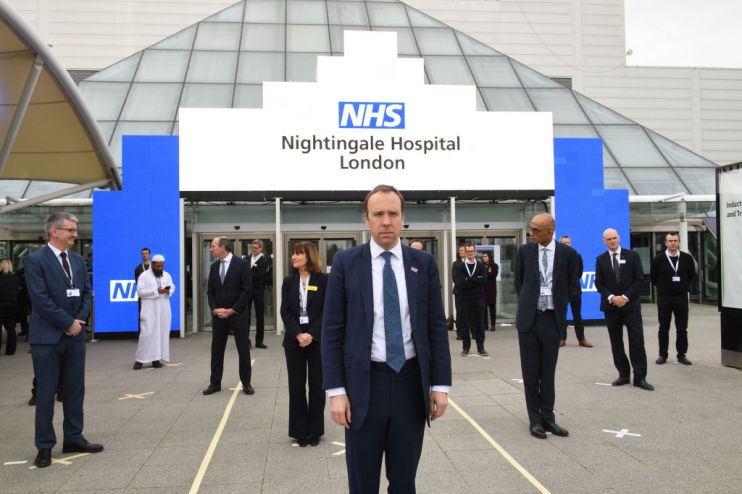Nightingale Hospitals were meant to save us, but the £500m idea was dead on arrival

NHS England announced yesterday that four out of seven Nightingale Hospitals will shut permanently from next month as coronavirus cases and hospitalisations continue to decline. The remaining three, including the site at London’s Excel Centre, will remain open as vaccination centres.
The temporary hospitals were swiftly erected in just two weeks last March to deal with a spiralling number of admissions to intensive care during the first wave of coronavirus.
But despite coming in at an estimated £532m to the taxpayer, the hospitals have barely been used. The Nightingale London, which was built to house a whopping 4,000 intensive care beds, was shuttered last year having treated just 54 patients during the first wave of coronavirus. It reopened in January at a meagre 1.5 per cent of its original capacity.
Announcing the closures yesterday, Health Secretary Matt Hancock said the winding up of the Nightingale Hospitals was an “important moment in our national recovery”.
The hospitals had been the “ultimate insurance policy in case existing hospital capacity was overwhelmed”, an NHS spokesperson added, before thanking NHS staff and a compliant public for preventing that from happening.
Except that it did. As the government sighs a breath of relief at averting total chaos during the pandemic, we should remember that hospitals up and down the country were repurposed into intensive care units (ICU) earlier this year, with beds squeezed into corridors and ICU nurses forced to care for triple their usual number of patients.
We should remember that urgent cancer operations were put on hold, with an estimated 4.6m people still waiting to start treatment at the end of January. We should remember the pictures of frontline workers with goggle marks around their eyes from working to the point of exhaustion. We should remember that the mayor of London declared a “major incident” in the capital at the start of January.
The Nightingale Hospitals are not closing because they were never needed. They are closing because we never had enough nurses and doctors to staff them. As Nicki Credland, chair of the British Association of Critical Care Nurses (BACCN), told City A.M. earlier this year, they were “never going to happen in the first place”.
London’s Nightingale Hospital alone would have required more ICU nurses than we have in the entire country, Credland added. “The only people that ever said the Nightingale Hospital in London could be opened were politicians. All of the clinicians have always said there is no way you are going to open a 4,000-bed intensive care unit,” she said.
Or as Anthony Johnson, lead organiser for the grassroots group Nurses United UK, put it: “Why do we allow politicians to gaslight us into thinking that we can just put some prefabricated units together and call it a hospital? To have a hospital you need staff.”
Though the total bill for the Nightingale Hospitals might appear a drop in the ocean compared to the £37bn allocated for Test and Trace, half a billion pounds is no pocket money. And while the merits of England’s contact tracing system are the topic of fierce debate, spending £532m on treating a handful of patients is money wasted by anybody’s calculations.
As Labour MP Margaret Hodge told City A.M: “Now the Nightingale Hospitals are to be closed, we urgently need an independent investigation that ensures the government never again misspends over half a billion pounds of our money like this. It’s time the government fessed up and apologised for this unprecedented waste of public money.”
Britain might be past the worst of the pandemic. But coronavirus rates remain high, with an estimated one in 204 people currently infected with the virus. The UK’s R rate, though still below the crucial 1.0 threshold, saw a modest rise last week from 0.6-0.9 to a best estimate of 0.7-0.9.
As Professor Chris Whitty warned yesterday: “A lot of people may think that this is all over. I would encourage them to look at what is happening in continental Europe at the moment where a lot of countries are going back, rates going up and having to close things down again having not been in that situation before.”
Now is no time to wipe sweat from the brow and reflect on crises averted, despite what Number 10’s glossy new videos might suggest. We are still in lockdown. There are still more than 10,000 people in hospital with coronavirus.
The Nightingale Hospitals are not closing because we are out of the woods, or because they were never needed at the height of the pandemic. They are closing because they were overly ambitious in the first place. As England edges closer towards its exit from lockdown, we must not allow logistical failures to be swept under the rug as triumphs.